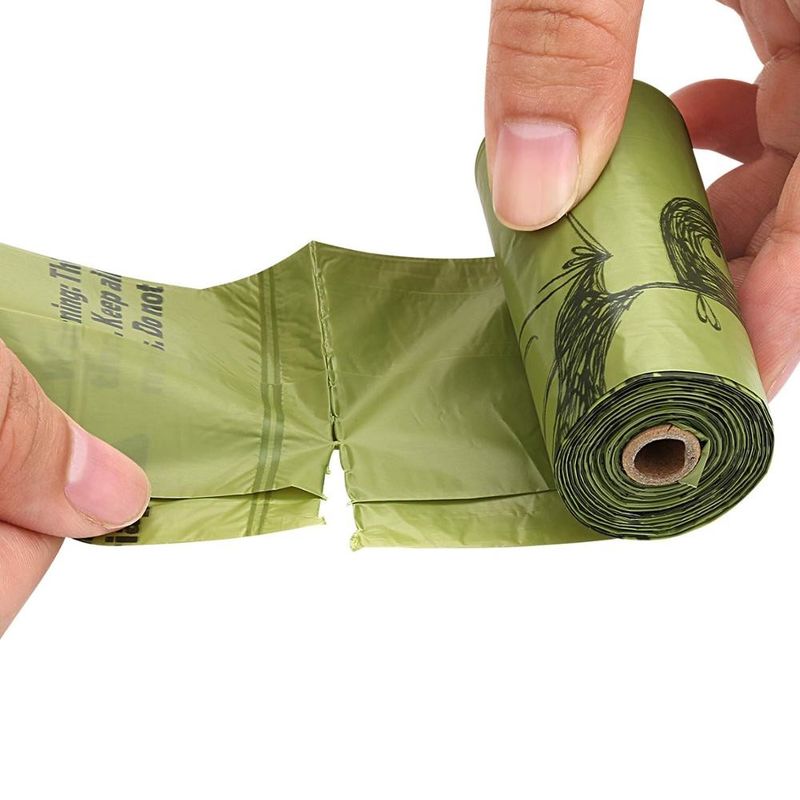What to do with dog poop until garbage day can be a common dilemma for pet owners. Handling dog waste in a responsible and hygienic manner is not only crucial for our environment but also for the overall health and well-being of our furry companions. While waiting for garbage day to come around, there are a few practical and eco-friendly solutions to ensure you keep your yard clean and odor-free, avoiding any unwanted surprises. Let’s explore some simple yet effective methods to tackle this smelly situation with ease, offering your four-legged friend a clean living space while maintaining your surroundings fresh and sanitary.
Table of Contents
How to Properly Deal with Dog Poop Until Garbage Day
As dog owners, we understand the importance of keeping our surroundings clean and hygienic. One of the main challenges that come with owning a dog is dealing with their waste. Properly managing dog poop until garbage day is essential not only for our own health but also for the environment. In this article, we will discuss some practical and responsible ways to handle dog poop between garbage pickups.
1. Use Biodegradable Poop Bags
Using biodegradable poop bags is an excellent way to dispose of dog waste responsibly. These bags are specially designed to decompose over time, reducing the impact on landfills. When you take your dog for a walk, always carry a biodegradable bag with you to collect their poop. Simply place the waste in the bag, tie it securely, and dispose of it in your regular garbage can.

Source www.cpeapron.com
2. Establish a Designated Poop Area
To make cleanup more efficient, consider establishing a specific area in your yard for your dog to do their business. By training your furry friend to use this designated spot, you can easily collect and dispose of the waste. This not only makes cleanup easier but also helps prevent the spread of bacteria and parasites to other areas of your yard.
3. Scoop and Flush
If you have access to a toilet, another eco-friendly option is to scoop the poop using a pooper scooper, dump it in the toilet, and flush it away. This method is particularly useful for small dogs or those who prefer to do their business closer to home. However, please ensure that the waste is well broken down to avoid clogging your toilet.
4. Dig a Compost Hole
Composting dog poop is an environmentally friendly way to dispose of it. Dig a hole in an inconspicuous area of your yard, away from edible plants or water sources. Bury the waste in the hole, cover it with soil, and let nature do its job. The bacteria in the soil will break down the waste, and the composted material can be used to nourish non-edible plants.
5. Use a Dog Waste Digester
A dog waste digester, also known as a dog poop septic system, is a great long-term solution. These devices are specifically designed to accelerate the decomposition process of dog waste. Dig a hole in your yard, place the digester inside, and regularly add an enzyme powder to aid in decomposition. This method reduces odor and minimizes the risk of contamination.
6. Install a Dog Waste Disposal System
If you have a large property or live in an area with numerous dogs, you may want to consider installing a dog waste disposal system. These systems are typically installed underground and function similarly to a septic system. They collect and break down the waste, ensuring it doesn’t end up in landfills or contaminate water sources. Consult a professional for proper installation.
7. Use a Pet Waste Collection Service
If you prefer not to handle dog waste yourself, you can opt for a pet waste collection service. These services typically provide specialized dog waste bins or pick up the waste directly from your yard on a scheduled basis. It’s a convenient option that ensures the proper disposal of dog poop without any hassle on your part.
8. Freeze the Waste
If you are concerned about odors and want to minimize the risk of attracting pests, you can freeze the dog waste until garbage day. Simply place the poop in a sealed bag or container and store it in the freezer. Freezing the waste helps contain any potential smells and prevents the growth of bacteria or parasites.
9. Pet Waste Digesting System
A pet waste digesting system, such as a natural bacteria-based solution, can aid in breaking down dog poop. These systems typically involve adding the solution to the waste, which helps accelerate decomposition. Follow the instructions provided with the product for optimal results. Remember to choose a solution that is safe for the environment and your pets.
10. Consider a Dog Poop Composting Service
In some areas, specialized dog poop composting services are available. These organizations collect dog waste and process it in large-scale composting facilities. The resulting compost can be used for non-edible plants and landscaping purposes. Research if any such services exist in your locality.
In conclusion, there are several responsible and environmentally friendly ways to handle dog poop until garbage day. Whether you choose to use biodegradable bags, establish a designated poop area, or explore alternative disposal methods, always prioritize cleanliness, hygiene, and the well-being of your surroundings. By following these practices, you can properly manage dog waste and contribute to a cleaner, healthier environment.

Source www.pinterest.com
10 Ways to Manage Dog Poop Until Garbage Day
Dealing with dog poop is an inevitable part of owning a furry friend. However, when it comes to managing it until garbage day arrives, some pet owners struggle to find the best solution. Fortunately, we have compiled a list of ten convenient ways to handle dog poop to keep your yard clean and odor-free!
1. Bag It Up
One of the simplest and most effective ways is to bag the dog poop. Whenever your four-legged companion does their business, make sure to have a supply of plastic bags at hand. Gently scoop up the waste, and tie the bag securely to prevent any unpleasant odors from escaping.
Pro tip: Opt for eco-friendly biodegradable bags that are gentle on the environment.
2. Dedicated Dog Waste Bin
Consider setting up a dedicated dog waste bin in your yard. Choose a bin that is easy to access and clearly labeled for dog waste only. This enables you to keep the waste separate from your regular garbage and makes the collection process more organized.
Pro tip: Line the bin with a trash bag to make disposal easier.
3. Composting
If you have a backyard garden or compost pile, dog waste can be composted. However, it is crucial to follow specific guidelines to ensure safe and sanitary composting. Use a designated composting bin for dog waste, allowing it to break down properly before using it as fertilizer.
Pro tip: Avoid using dog waste compost on edible plants or vegetables.
4. Flush It Down
In select cases, flushing dog poop down the toilet can be a viable solution. However, always check with local regulations to ensure this is permitted. Use a small shovel or scooper to transfer the waste into the toilet bowl, and then flush it away.
Pro tip: Consider using septic-safe dog poop bags to avoid any plumbing issues.
5. Professional Waste Disposal Services
If you prefer a hands-off approach, hiring a professional waste disposal service specifically catered to dog waste can be a convenient option. These services collect the waste from your yard regularly, ensuring proper disposal and maintaining cleanliness.
Pro tip: Research and compare local waste disposal services to find the most reliable and cost-effective option.
6. Bury It Deep
An age-old method for managing dog waste until garbage day is to dig a hole in a designated area of your yard and bury it. Ensure the hole is deep enough to prevent any animals from digging it up. Fill the hole with soil once the waste is buried.
Pro tip: Consider marking the spot to avoid accidental digging in the future.
7. Dog Waste Disposal Systems
Investing in a dog waste disposal system can make your life easier. These systems usually consist of an in-ground waste digester that breaks down the waste through a natural biological process. Such systems help control odors and keep your yard clean.
Pro tip: Follow the manufacturer’s instructions for optimal use of the disposal system.
8. Doggie Poop Composters
For those who are environmentally conscious, installing a doggie poop composter is an excellent choice. These devices use beneficial bacteria to accelerate the decomposition process. The end result is nutrient-rich compost that can be used in non-edible areas of your garden.
Pro tip: Remember to regularly turn the composter to speed up decomposition.
9. Pet Waste Vacuum Systems
If you have a large yard or multiple dogs, a pet waste vacuum system might be the solution for you. These systems effortlessly suck up dog poop using a vacuum cleaner-like mechanism. The waste is then collected in a disposable bag, ensuring a clean and quick disposal process.
Pro tip: Compare different pet waste vacuum systems to find one that suits your needs best.
10. Dog Waste Stations
If you live in a neighborhood or community with many dog owners, consider suggesting the installation of dog waste stations. These stations typically include a waste bag dispenser and a dedicated bin for easy disposal. Encourage fellow pet owners to responsibly clean up after their dogs.
Pro tip: Reach out to your local authorities or homeowner associations to discuss the possibility of installing dog waste stations within your community.
In conclusion, there are several practical and eco-friendly ways to manage dog poop until garbage day arrives. Choose the method that aligns with your preferences, regulations, and ensures a clean environment for both you and your furry friend.
1. Consider Composting
If you are looking for an environmentally friendly way to dispose of your dog’s poop, consider composting it. Composting breaks down organic waste, including dog poop, into nutrient-rich fertilizer that can be used in your gardens or flower beds. It reduces waste and is a sustainable option.
To compost dog poop, you will need a dedicated compost bin specifically for pet waste. Make sure the bin is securely covered and placed in a well-ventilated area away from edible plants. Layer the poop with carbon-rich materials such as leaves, wood chips, or straw. Avoid using any dog waste compost in vegetable gardens or areas where children play to prevent any potential health risks.
Although composting dog waste is an eco-friendly solution, remember to avoid using the compost on plants that you will consume directly to minimize any possible contamination risks.
2. Flush It Down the Toilet
Flushing dog poop down the toilet is an option for pet owners who have access to a sewer system and follow proper guidelines. This method is convenient, especially for small dogs or when you do not have a backyard to dispose of the poop. However, it is essential to consider the potential impact on the sewage system.
Before flushing, check with your local sewage treatment department to ensure that it is allowed. Some municipalities have regulations against flushing pet waste due to concerns about the strain on sewage systems or if they have specific treatment systems that cannot process pet waste. If you receive the green light, ensure the poop is bagged and securely tied before disposal.
Remember, flushing pet waste should only be done if it is allowed and suitable for your specific sewage system. Always follow local guidelines and regulations to prevent any negative impact on the environment and infrastructure.
3. Utilize a Pet Waste Digester
A pet waste digester is a simple and effective way to deal with dog poop until garbage day. It is a specially designed device that breaks down the waste using natural enzymes, turning it into a safe liquid that can be absorbed into the ground. This method is odorless, eco-friendly, and helps avoid the use of plastic bags.
To use a pet waste digester, you typically need to insert dog waste into the device, add an enzyme or bacterial powder, and allow the natural decomposition process to take place. Follow the manufacturer’s instructions for the specific digester you choose, as different models may have slightly different guidelines. Ensure you regularly maintain the digester by cleaning it and adding more enzymes or powder as needed.
However, keep in mind that pet waste digesters may not be suitable for areas with high groundwater levels or heavy clay soil. It’s important to assess your soil condition and groundwater levels before opting for this method.
4. Hire a Pet Waste Removal Service
If you prefer leaving the handling of dog poop to professionals, hiring a pet waste removal service can be a convenient option. These services specialize in scooping and disposing of dog waste, ensuring your yard stays clean and fresh all week long.
When hiring a pet waste removal service, you can schedule regular visits based on your needs – weekly, bi-weekly, or monthly. The service providers will come to your location, scout for dog waste, and remove it for proper disposal, often taking it to a facility that handles pet waste responsibly.
Make sure to choose a reputable pet waste removal service that follows ethical and environmentally friendly practices. Research local companies, read reviews, and inquire about their disposal methods to ensure they align with your values and priorities.
5. Wrap in Biodegradable Bags and Dispose of in Regular Trash
If none of the above options are feasible or suitable for your situation, wrapping dog poop in biodegradable bags and disposing of it in regular trash is a practical solution. Biodegradable bags are designed to break down over time, reducing their environmental impact compared to conventional plastic bags.
When using biodegradable bags, ensure that they are certified as such and follow the instructions for proper disposal. Tie the bag securely to seal in the odor and prevent any leaks. Place the bag in your regular trash bin, which will be collected and taken to a landfill or waste management facility.
Remember to double-check your local regulations regarding waste management. Some municipalities allow pet waste in regular trash bins, while others may have specific guidelines for its disposal. Adhering to local guidelines ensures proper waste management practices and reduces the impact on the environment.
| Method | Pros | Cons |
|---|---|---|
| Composting | – Environmentally friendly – Reduces waste – Creates nutrient-rich fertilizer |
– Not suitable for vegetable gardens – Requires a dedicated compost bin – Limited use due to possible contamination risks |
| Flush It Down the Toilet | – Convenient for small dogs – No backyard needed – Eliminates plastic bags |
– Restrictions may apply – Could strain sewage systems – Not suitable for certain treatment systems |
| Pet Waste Digester | – Odorless – Eco-friendly – No plastic bag usage |
– Unsuitable for certain soil conditions – Might not work in areas with high groundwater levels |
| Pet Waste Removal Service | – Hassle-free – Keeps yard clean – Professional handling |
– Ongoing cost – Dependent on the availability of local services |
| Wrap in Biodegradable Bags and Dispose of in Regular Trash | – Environmentally friendlier than regular plastic bags – Suitable when other options are not feasible |
– Bag decomposition may take longer – Check local regulations for pet waste disposal |
Thanks for Reading and See You Again Soon!
I hope this article has helped you better understand what to do with dog poop until garbage day. Remember, it’s important to clean up after our furry friends to maintain a clean and healthy environment for everyone. Whether you choose to flush it down the toilet or use a pet waste disposal system, just make sure you dispose of it responsibly. And, if you enjoyed this article, be sure to visit our website again soon for more useful tips and information on dog care. Thanks for reading, and we’ll see you again shortly!
 Treat For Dog – Brain Training for Dogs, Dog Training & Obedience Discover Treat For Dog and get your pup on the path to smarter, happier, and healthier living with brain training for dogs.
Treat For Dog – Brain Training for Dogs, Dog Training & Obedience Discover Treat For Dog and get your pup on the path to smarter, happier, and healthier living with brain training for dogs.



